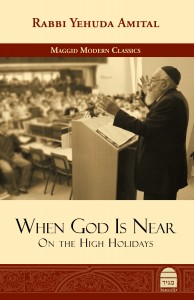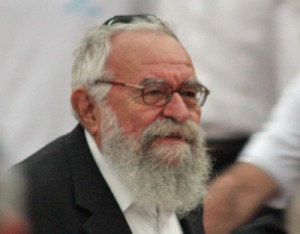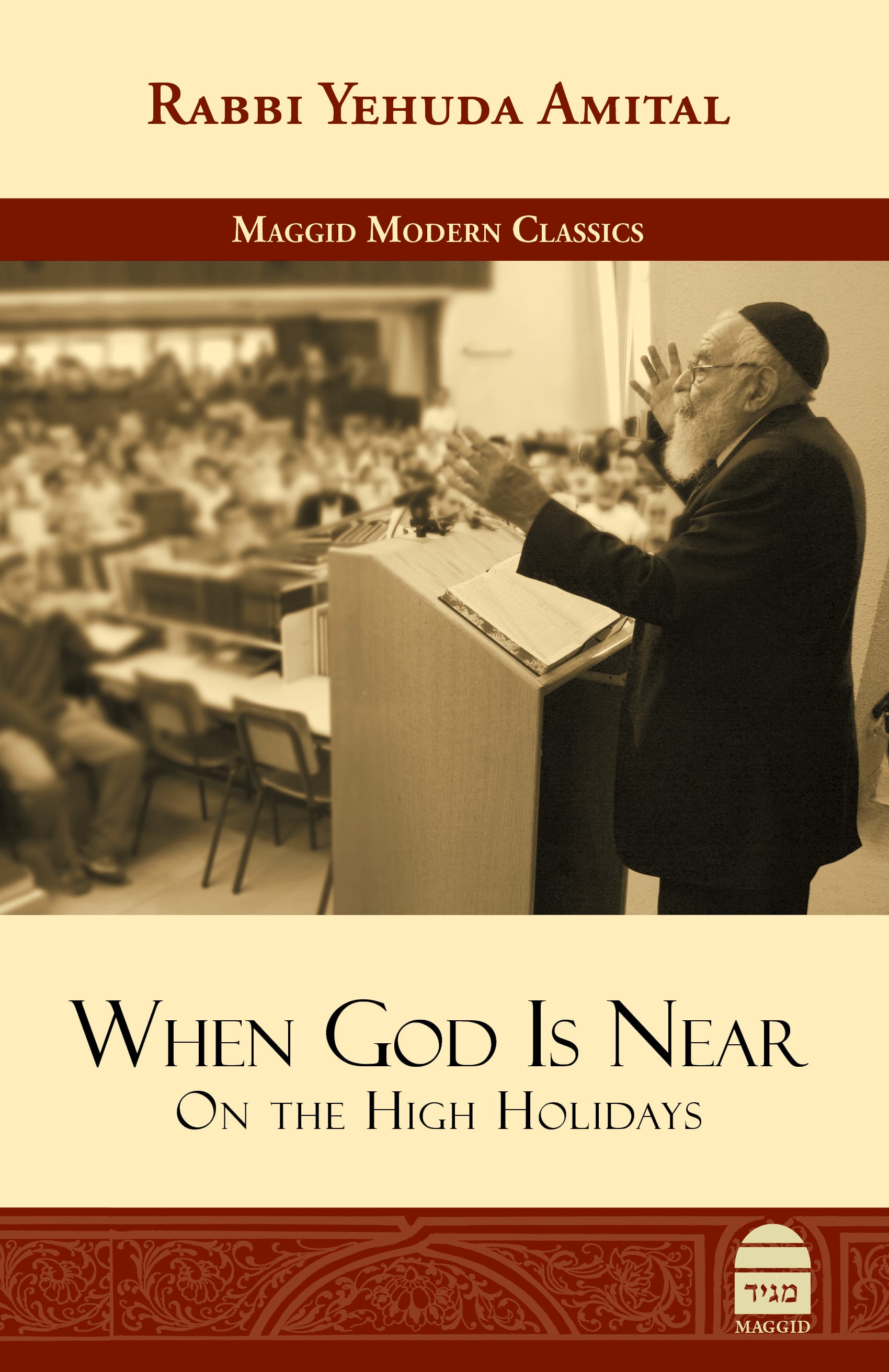(Excerpt from When God is Near: On the High Holidays, by Rabbi Yehuda Amital)
 For decades, thousands from around the world gathered to join Rabbi Yehuda Amital zt”l as he led the High Holiday prayers at Yeshivat Har Etzion. Right before the most critical points in the services, at moments of high spiritual intensity, he would pause to address the assembled with words that uplifted, inspired, and enlightened. He poured into these words the depths of feeling, insight, and experience he had accumulated on his personal journey from the ashes of the Holocaust to the miraculous revival of Jewish statehood and in his life’s work as an educational visionary and pioneering thinker.
For decades, thousands from around the world gathered to join Rabbi Yehuda Amital zt”l as he led the High Holiday prayers at Yeshivat Har Etzion. Right before the most critical points in the services, at moments of high spiritual intensity, he would pause to address the assembled with words that uplifted, inspired, and enlightened. He poured into these words the depths of feeling, insight, and experience he had accumulated on his personal journey from the ashes of the Holocaust to the miraculous revival of Jewish statehood and in his life’s work as an educational visionary and pioneering thinker.
The following is adapted from Rabbi Amital’s Dvar Torah from Shabbat Teshuva, as it appears in When God Is Near.
“Moses went and spoke these words to all of Israel” (Deut. 31:1) The word “went” (vayelekh) always indicates rebuke, as it is written, “Go (lekhu), behold the works of the Lord” (Ps. 46:9). (Tanĥuma, Vayelekh1)
The Midrash teaches us that what Moses conveyed to the Children of Israel was rebuke. However, the plain meaning of the text seems to follow Nahmanides’ interpretation:
To comfort them concerning his situation, telling them, “I am old, and you have no more use for me; moreover, God has commanded that I shall not cross over there. But do not fear and do not be afraid, for God will cross over with you; He shall not remove His Divine Presence from you on my account.” (Nahmanides, Deut. 31:2)
These are calming, soothing words; why, then, does the Midrash view Moses’ speech as one of rebuke?

Moses’ words are indeed soothing words of farewell: “I am a hundred and twenty years old this day; I can no more go out and come in; also the Lord has said to me, ‘You shall not cross over this Jordan’” (Deut. 31:2). However, there is also rebuke, in the form of thundering silence. The rebuke arises from the image of Moses who is no longer able “to go out and come in.” Rashi explains, “I am not permitted to do so, for permission has been taken from me and given to Joshua.”
The tragedy of Moses is, “But the Lord was angry with me for your sake” (3:26). Because of the actions of the Children of Israel, he is not permitted to enter the land. So Moses soothes the people, but his words also convey silent rebuke: you will be entering the land, but without me; I am prevented from entering because of your actions!
This relates to the character of the teshuva of Shabbat. The source for the mitzva of teshuva is, “Then they shall confess their sin which they have committed” (Num. 5:7). As we know, on Shabbat we do not say Viduy; what mode of teshuva, then, is appropriate for Shabbat? It seems that the teshuva of Shabbat is undertaken not through words – verbal confession – but rather through self-examination. In Parashat Nitzavim we are told, “and you shall take it to heart” (Deut. 30:1). Nahmanides maintains that this is an integral part of the commandment of teshuva:
“For this commandment, which I command you this day – it is not hidden from you, nor is it far off ” (Deut. 30:11) – “This commandment” refers to teshuva, for “you shall take it to heart… and you shall return to the Lord your God” is a mitzva that we are commanded to perform. (Nahmanides, Deut. 30:11)
The teshuva of Shabbat, then, is “thinking about them” – self-examination.
And it shall be, when all these things have come upon you, the blessing and the curse which I have set before you, and you shall take it to heart among all the nations into which the Lord your God has driven you, and shall return to the Lord your God, and shall obey His voice according to all that I command you this day – you and your children, with all your heart, and with all your soul. (Deut. 30:1–2)
Again, the command, “you shall take it to heart,” refers to teshuva through self-examination. The verses describe a consideration of why the nation is in exile “among all the nations into which the Lord your God has driven you.” Haazinu likewise demands, “Remember the days of old; consider the years of many generations” (32:7), and recounts traumatic events from Jewish history – “I will move them to jealousy with a non-people; I will move them to anger with a vile nation” (v. 21). The Torah commands that the song of Haazinu be written down, and the medieval authorities (Mishneh Torah, Laws of Torah Scrolls 7:1; Sefer HaEshkol) write that this command is the basis of the requirement that the entire Torah be committed to writing. The most important element, though, is this song of self-examination of the nation’s past and present.
Teshuva involving examination of the fate of the Jewish people is especially significant at a time of redemption. We see in recent historical events some wondrous phenomena that demand that we engage in self-examination. Although God’s hand is hidden, and we do not understand the meaning of the events, we must examine the state of the nation.
Examination of the state of the Jewish people is a component of communal teshuva. At the same time, “national” teshuva results from the teshuva of individuals. There is no separate reality of the nation with- out the individuals, and therefore the teshuva of the individual is an integral part of the national teshuva. The two processes are intertwined, and as Ĥazal teach, on Rosh HaShana we pass “like a flock of sheep” – each individual on his own, while at the same time “they are taken in in a single glance” (Rosh HaShana 18a); the totality is judged as a single entity.
The teshuva of the individual entails examination of oneself, of God’s demands of him as an individual. This self-examination must take place within the person. W hen we examine things from without, we tend to attribute events and actions to external circumstances, but when one engages in self-examination, a person comes to the realization that “it is because my God is not in my midst that these troubles have befallen me” (Deut. 31:17). I must look to myself for the explanation.
Genuine self-examination requires plumbing the depth of evil and what leads to it, so that we can fix the causes of sin. Parashat Vayelekh teaches:
Then My anger will burn against them on that day, and I will forsake them, and I will hide My face from them, and they shall be devoured, and many evils and troubles shall befall them, so that they will say on that day, “Are not these evils come upon me because my God is not in my midst?” And I will surely hide My face on that day for all the evils which they shall have perpetrated, in that they have turned to other gods. (vv. 17–18)
The commentators ask, why is it specifically after the stage of confession and realization that “God is not among us” that God responds by “hiding His face”? The Shem MiShemuel writes, in the name of his father, the Avnei Nezer:
My father, our rabbi and teacher of saintly memory, explained that they will have done teshuva only for the actual transgression that caused the distancing of the Divine Presence, but not for the root of sin which brought about that transgression, for a slight transgression brings in its wake a more serious transgression. (Shem MiShemuel, Vayelekh 672)
In other words, it is not enough to say, “because my God is not in my midst”; a person has to try to uncover “the root of the sin which brought about that transgression.” Examination of the deeper recesses of sin, and its causes, is an essential part of teshuva.
On the other hand, one also has to examine deeply the good that God bestows on us. Our challenge today is to muster all our energies, “‘with all of your heart’ – meaning, with both of your inclinations” (Berakhot 54a). The energy for building the nation depends on each and every individual. This is the meaning of the teshuva of Shabbat – a teshuva of self-examination that arises from the command, “you shall take it to heart.”
The words of this author reflect his/her own opinions and do not necessarily represent the official position of the Orthodox Union.
